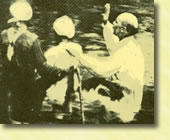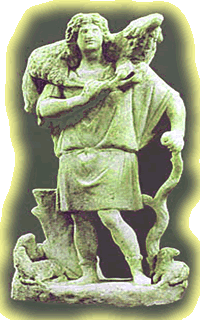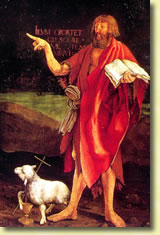In the Church Calendar that you can find at the beginning of your copy of the Book of Common Prayer, you will note that today is the feast day of Augustine of Hippo. I believe strongly in expository preaching, and it is my usual practice to preach on the lectionary readings for the day. However, I am now officially a member of the faculty here at Trinity, and, as one of the first exercises of the freedom and authority granted me by my new position, I am going to depart from the liturgically correct position, and preach a topical sermon. I have decided to disregard the lectionary readings entirely and preach on St. Augustine instead. Please do not try this in your homiletics class.
Augustine, as I’m sure you all know, is perhaps the most important theologian in the Western Church. He is claimed as an authority by both Catholics and Protestants – although both sides would claim that the other side had misunderstood him. Augustine has certainly been important for Anglicans. You may have noticed that his portrait is on the Trinity iconostasis on the wall outside the library. There’s a gap of about a thousand years between Augustine’s picture and Wycliffe’s, but I have always assumed that was because Trinity ran out of money or space before they could finish adding the portraits on the left side of the wall.
Augustine was very important in my own theological development. I grew up in a free church Evangelical denomination, where it was more or less assumed that the Holy Spirit disappeared between the death of the apostle John (who died shortly after writing the book of Revelation) and the Reformation. If you look at the Trinity wall, you know better. The Spirit came back for Augustine. I read Augustine’s Confessions as an undergraduate, and my eyes were opened. He led me into the world of theology and church history. I can safely say that I am standing here now because I read Augustine as an undergraduate.









 Today is the feast day of the Confession of St. Peter. What could I say to you about Peter that you yourselves have not heard a hundred times before? As I’m sure you know, the passage from the gospel this morning has been controversial in the history of the church, with Roman Catholics interpreting the passage to mean that not only is Peter the rock on whom the church is founded, but that the bishop of Rome—the pope—is the successor of Peter. Western Reformation Christians and Orthodox Christians have interpreted the passage otherwise.
Today is the feast day of the Confession of St. Peter. What could I say to you about Peter that you yourselves have not heard a hundred times before? As I’m sure you know, the passage from the gospel this morning has been controversial in the history of the church, with Roman Catholics interpreting the passage to mean that not only is Peter the rock on whom the church is founded, but that the bishop of Rome—the pope—is the successor of Peter. Western Reformation Christians and Orthodox Christians have interpreted the passage otherwise.
